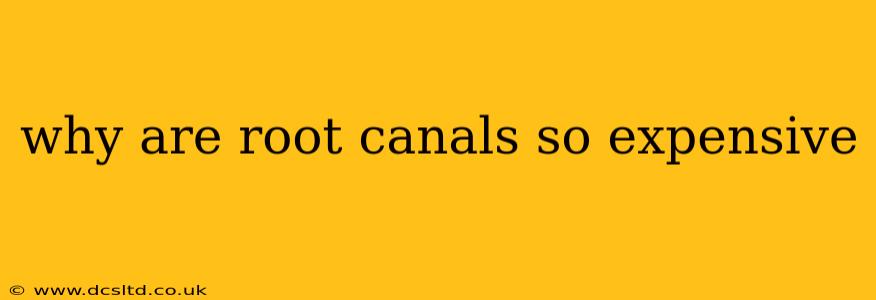Root canal treatment is often perceived as a costly dental procedure, leaving many patients wondering why. The price tag isn't arbitrary; several factors contribute to the significant expense. Understanding these factors helps patients make informed decisions about their oral health and budget.
What Makes a Root Canal Procedure So Expensive?
The high cost of root canals stems from a combination of factors, all contributing to the complexity and precision required for successful treatment:
-
Specialized Expertise and Training: Endodontists, specialists in root canal therapy, undergo extensive training and education beyond general dentistry. This advanced expertise commands a higher fee, reflecting the years of specialized learning and skill development. General dentists also perform root canals, but their fees may vary based on experience and location.
-
Advanced Technology and Equipment: Modern root canal treatment relies on sophisticated tools and technologies. Microscopic magnification, specialized files, and digital radiography improve accuracy and efficiency. These advanced instruments require significant investment, adding to the overall cost of the procedure.
-
Time and Labor Intensive: Root canals are not quick procedures. They require meticulous attention to detail, often spanning multiple appointments. The dentist needs to carefully clean, shape, and seal the root canals to prevent reinfection. This time investment translates into a higher overall fee.
-
Materials and Supplies: The materials used in root canals are not inexpensive. High-quality gutta-percha, used to fill the root canals, along with sealants and other materials, contribute to the overall cost. The quality of these materials is directly related to the long-term success of the procedure.
-
Pre- and Post-Operative Care: Root canal therapy often involves additional procedures. This may include pre-operative X-rays, post-operative medication, and possibly a crown or other restorative work to protect the treated tooth. These additional services add to the total expense.
-
Geographic Location: The cost of dental procedures, including root canals, can vary significantly based on geographic location. Areas with higher costs of living tend to have higher dental fees.
What are the Alternatives to Root Canals?
H2: What are the alternatives to root canals?
The primary alternative to a root canal is tooth extraction. This is often a less expensive option in the short term, but it leads to the permanent loss of the tooth. Replacing an extracted tooth can be costly, requiring either a dental implant, a bridge, or a partial denture. In the long run, the cumulative cost of extraction and replacement can often exceed the cost of root canal therapy.
How Can I Reduce the Cost of a Root Canal?
H2: How can I reduce the cost of a root canal?
Several strategies can help manage the cost of a root canal:
-
Dental Insurance: Many dental insurance plans cover a portion of root canal treatment. Check your policy details to understand your coverage.
-
Payment Plans: Reputable dental practices often offer payment plans or financing options to make treatment more affordable.
-
Seek multiple quotes: Getting quotes from several dental practices can help you compare prices and find the most cost-effective option.
-
Preventive Care: Regular dental checkups and cleanings can help prevent dental problems that may necessitate root canal treatment in the first place, ultimately saving you money in the long run.
Is a Root Canal Worth the Investment?
H2: Is a root canal worth the investment?
The expense of a root canal may seem significant, but it's crucial to consider the long-term value. Saving a natural tooth is generally preferable to tooth extraction and replacement. A successful root canal can restore the function and aesthetics of a damaged tooth, preserving your smile and overall oral health for years to come.
This detailed analysis addresses the cost of root canals, exploring the contributing factors and offering alternatives and cost-saving strategies. Remember to consult with your dentist to discuss your specific situation and available options.
